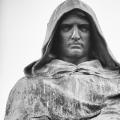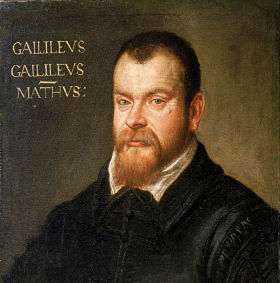369. The Harder They Fall: Galileo and the Renaissance
Did Galileo’s scientific discoveries grow out of the culture of the Italian Renaissance?
Themes:
• I.E. Drabkin and S. Drake (trans.), Galileo Galilei, On Motion and On Mechanics (Madison: 1960).
• M.A. Finocchiaro (trans.), The Essential Galileo (Indianapolis: 2008).
---
• R.E. Butts and J.C. Pitt (eds), New Perspectives on Galileo (Dordrecht: 1978).
• S. Drake, Galileo at Work: His Scientific Biography (Chicago: 1978).
• H. Gatti, “Giordano Bruno’s Ash Wednesday Supper and Galileo’s Dialogue of the Two Major Systems,” Bruniana e Campanelliana 3 (1997), 283-300.
• N. Jardine, “Galileo’s Road to Truth and the Demonstrative Regress,” Studies in the History and Philosophy of Science 7 (1976), 277-318.
• P. Machamer (ed.), The Cambridge Companion to Galileo (Cambridge: 1998).
• P. Palmieri, A History of Galileo’s Inclined Plane Experiment and its Philosophical Implications (Lewiston: 2011).
• C.B. Schmitt, “Experience and Experiment: A Comparison of Zabarella’s View with Galileo’s De Motu,” Studies in the Renaissance 16 (1969), 80-138.
• W.A. Wallace, Prelude to Galileo: Essays on Medieval and Sixteenth-Century Sources of Galileo’s Thought (Dordrecht: 1981).
• W.A. Wallace (ed.), Reinterpreting Galileo (Washington D.C.: 1986).
• W.A. Wallace, Galileo’s Logic of Discovery and Proof: the Background, Content, and Use of His Appropriated Treatises on Aristotle’s Posterior Analytics (Dordrecht: 1992).







Comments
Galileo
A great episode, especially as compression is so difficult. I would like to hear more about the trial(s) and perhaps we will later as you will be talking about the Catholic Reformation. Galileo did grow out of the culture of the Renaissance, and while there was much that was Aristotelian (esp. through the Roman Jesuits) there were were many elements, Platonic and other (he seemed rather eclectic), which others have referred to. You do a difficult thing and you deserve all the praise that people give you.
Minor Physics Detail
Hi Peter,
It's not very consequential to the episode as a whole, but I just wanted to correct your statement about the law of falling bodies that Galileo discovered. You said that the speed was proportional to the square of the time. But actually, it's the total change in position that's proportional to the square of the time. The speed is directly proportional to the time and the acceleration--the rate of change of speed--is constant.
In reply to Minor Physics Detail by Eric
Speed vs distance
Ok, thanks for the correction! And yes of course that's right, sorry for the slip.
Galileo on Scripture
I'm a bit confused on the scripture part.
A: I thought scripture needing to be in agreement with current scientific understanding was a central part of Augustine's statements on how the bible should be interpreted. Am I mistaken? Did this fall out of Fashion?
B: I heard that Galileo spent a lot of time writing about the "correct" reading of scripture. In the example given, he said God did stop the sun, he stopped the sun spinning, and everything in the universe only is in motion because the sun is rotating (including earth's rotating on its axis, as well as its revolving around its equant, and the equant revolving around the sun). Is this mistaken as well?
In reply to Galileo on Scripture by Alexander Johnson
Galileo on Scripture
On point A, Augustine's theory of scriptural exegesis is of course very complicated. I don't think compatibility between exegesis and natural science is a prime concern for him, he is much more interested in things like the centrality of the value of caritas in our interpretations. I certainly don't think he would go so far as Galileo (or Averroes) by suggesting that the natural scientist can just dictate to the theologian what the acceptable interpretations are, but he and most medieval thinkers would surely at least agree that natural science, when done well, is not going to disagree with the correct exegesis since both will be true. I think the issue is more one of who has the authoritative position, and of course in Augustine's environment there was no one remotely like Galileo!
On point B Galileo's discussion of these topics is indeed extensive but also rather dialectical, that is, he is trying to refute the churchmen who tried to use the Bible to disprove Copernicanism. In the case you mention, he basically just says "well if God really stopped the sun, that would be easier to explain in my system than yours."
Spheres on a slope
The speed of spherical or cylindrical bodies that accelerate downhill is not easily predictable also for a reason other than friction of the surface and the air: The moment of rotational inertia. The potential energy of body that starts to roll down a slope is transformed into two "flavours" of motion energy, the sum of which cannot be bigger than the original potential energy: One is connected to the translatorial speed (the downhill speed) plus the other one connected to the rotational speed of the ball or cylinder. The heavier a body, the more moment of inertia it has. This is why a heavy ball rolls down a hill slower than a light ball (all other circumstances being equal) - and this is also why a bicycle is quite stable when moving but shaky when very slow. The moment of inertia does also depend on the inner structure of the sphere or cylinder, whether it is massive or hollow and so on. The Wikipedia article "Moment of inertia" has a few nice illustrations about this.
Does Philosophy of Science help us to do Science ?
New here to Philosophy (came by way of interest in Greek Mathematics), and starting with your book Classical Philosophy (exceptionally well written).
I'm wondering if you will eventually be able to say something about Philosophy of Science. The sources I have found so far (all introductory) pose such questions as: how can we be confident that Reality actually exists, or that it is governed by laws ? While these are questions that I suppose ought (initially) to be asked, apparently Philosophers of Science do not attempt to go beyond this; thus it is no accident that a course in Philosophy of Science is not part of a Physics Major; there is nothing to be learned there. Instead, Physics is taught by example, to some extent by giving historical examples, and partly by just letting students figure out for themselves how to do Physics (trial and error). Yet this approach either just gives up, or else tacitly assumes that an actually useful Philosophy of Science - in terms of being helpful at arriving at scientific knowledge - simply isn't possible, an interesting conclusion to say the least.
(Philosophy has nothing to do with Reality?)
In reply to Does Philosophy of Science help us to do Science ? by Mark Victor
Philosophy of science
Actually there has been quite a lot of philosophy of science already in the series. Many episodes are on actual scientific topics (see under the relevant theme) and we have had not only Aristotle's theory of science in the Posterior Analytics but also lots of reactions to it, including most recently the episode on Zabarella in the Renaissance series.
In general I would say that scientists actually used to be more conscious of their philosophical and methodological presuppositions than they are now; this ceased being the case when philosophy and the empirical sciences started to drift apart but this is really only a phenomenon of the last couple of centuries.
How did Galileo Communicate his science findings?
Thank you for the beloved podcast, and anither fantastic episode. I'm really curious - given that Galileo really did 'see things no man had ever seen before', how did he communicate his scientific (astronomical) discoveries with others, short of putting a person physically in front of his telescope to observe what he could observe?
Cameras had not been invented at this point (right?), so how did he convince anyone that he wasn't making things up about moons around Jupiter etc. Did he write detailed descriptions of what he saw? Draw sketches of astronomical bodies? Include tables or times and orbital details that others could verify? How did he convince other scientists of the day, let alone sceptics like the Inquisition, that he had discovered something worth paying attention to?
Is there anywhere online I can view scans of some of his original writings for myself to take a look?
Thank you!
In reply to How did Galileo Communicate his science findings? by Aaron S
Galileo
Well I am not the biggest expert on this but basically the answer is one of the ones you mentioned: drawings, there are pictures of what he saw on the moon which you can just google image, but here is one:
https://beinecke.library.yale.edu/article/galileo-sidereus-nuncius
Also it wasn't like he was the only one with a telescope for years and years; other scientists were able to double check relatively soon I think.
Add new comment